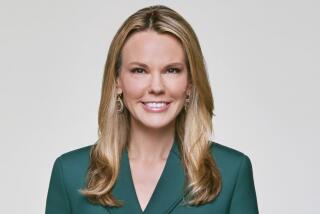Jordan Decides to Retire Early as CBS Chief
- Share via
Michael Jordan, who engineered one of the most dramatic corporate transformations in history at Westinghouse Electric Corp., plans to retire at the end of the year as chairman and chief executive of its successor company, CBS Corp.
Jordan’s early retirement marks the continuing rise at CBS of its largest individual shareholder, Mel Karmazin, president and chief operating officer, who will assume the additional role of chief executive.
Some entertainment executives say the succession could clear the way for dramatic initiatives by Karmazin, including dismantling the Tiffany network built by William Paley. While CBS’ radio and television station groups are very profitable, the network is losing money and faces escalating costs for programming and sports rights.
Karmazin, known for his single-minded focus on stock price, has toyed with such radical ideas as leasing the network under a long-term contract to a program supplier such as Time Warner or Viacom. Sources say he more recently championed a deal to merge CBS News with Time Warner’s CNN cable network to cut costs by shutting news bureaus.
While pointing out the benefits of the CNN-CBS combination, Karmazin said in an interview Wednesday that those talks are no longer active. And despite a recent swirl of rumors that Sony Pictures Entertainment could be in talks about an alliance with CBS, Karmazin said there was no evidence that studio partners could help networks prosper, citing the declines in ABC and Fox ratings this season.
Of the six broadcast networks, only NBC and CBS lack studio partners. NBC is the only network that made any significant profit last year.
The announcement of Jordan’s retirement was a surprise only in timing. Jordan, 62, had pledged last April to retire from the company at the age of 65.
Karmazin has raced up the ranks at CBS since January 1997, when he sold his Infinity Broadcasting radio group to the company and became chief of CBS Radio. He then took over the television station operation and last April was named Jordan’s No. 2.
CBS said the board will elect a chairman, probably Karmazin, by the end of the year.
Jordan and Karmazin dismissed speculation that mounting friction between the two executives figured in the timing of Jordan’s retirement.
“In any company, people take different points of view and try to reconcile them,” Jordan said. “There’s nothing of real significance here.”
Karmazin said having Jordan as a boss hadn’t interfered with his ability to carry out his agenda. “This is not something I wanted,” Karmazin said. “I don’t think I’ll get invited to any better parties” after becoming chief executive.
Jordan said he began discussing his retirement last November and that he is leaving because he has accomplished his goals of reconstituting Westinghouse, although he said he has no specific plans.
Sources maintain that the management styles of the two executives did not mix well. Jordan, a former McKinsey consultant, is a strategist at heart, reserved and analytical, while Karmazin is a hard-charging executive who likes to move quickly and get things done.
Others speculate that Karmazin’s zealous cost-cutting efforts and take-no-prisoners style made Jordan bristle. Some say Karmazin favors aggressive measures to cut costs. Jordan was less inclined to tamper with the news operation. In connection with the news operation, sources quote Karmazin as saying, “I don’t care about arts and crafts, I care about commerce.”
“They are different managers with different styles,” said one executive who knows both. “This was inevitable.”
Yet CBS today is largely Jordan’s creation. In a sweeping transformation of Westinghouse, he bought and sold assets, converting the troubled industrial giant into a purely broadcast and media company. Jordan said the turning point came in 1994, when Fox lured a key group of affiliates away from CBS, setting off a flurry of affiliation switches. Jordan said he started eyeing CBS as a potential acquisition after NBC and CBS began wooing Westinghouse’s Group W station group for exclusive affiliation.
Westinghouse agreed to buy CBS for $5.4 billion the following year. It also bought Infinity to shore up radio, Gaylord Entertainment to enter the cable business and, earlier this year, after a four-year hiatus, signed an expensive contract with the NFL to bring football back to the network.
Along the way, Jordan engineered the sale of Westinghouse’s key industrial assets in electronics, defense and refrigeration. He said his biggest disappointment was having to liquidate Westinghouse Electric rather than splitting it into a free-standing public company as originally intended.
While the restructuring has been mostly applauded on Wall Street, Jordan’s sale of Westinghouse’s power-generation business was followed by a surge in orders in that business.
But while Jordan is credited with re-engineering Westinghouse, Karmazin has been more instrumental in improving performance at the slumping TV station group and driving up, until recently, the long-languishing stock price.
Though CBS’ share price has sagged because of fears that a recession will hurt the television group, Karmazin is still planning on spinning off part of its radio and billboard company and rehabilitating the Infinity Broadcasting name.
The recent decline in CBS’ shares has cost Karmazin heavily, although his 1.5% stake is still worth about $270 million. Jordan will leave the company with stock worth nearly $50 million.
Jordan’s retirement from the company was announced after trading hours. CBS shares rose 25 cents to close at $25.38 on the New York Stock Exchange.
More to Read
The biggest entertainment stories
Get our big stories about Hollywood, film, television, music, arts, culture and more right in your inbox as soon as they publish.
You may occasionally receive promotional content from the Los Angeles Times.










